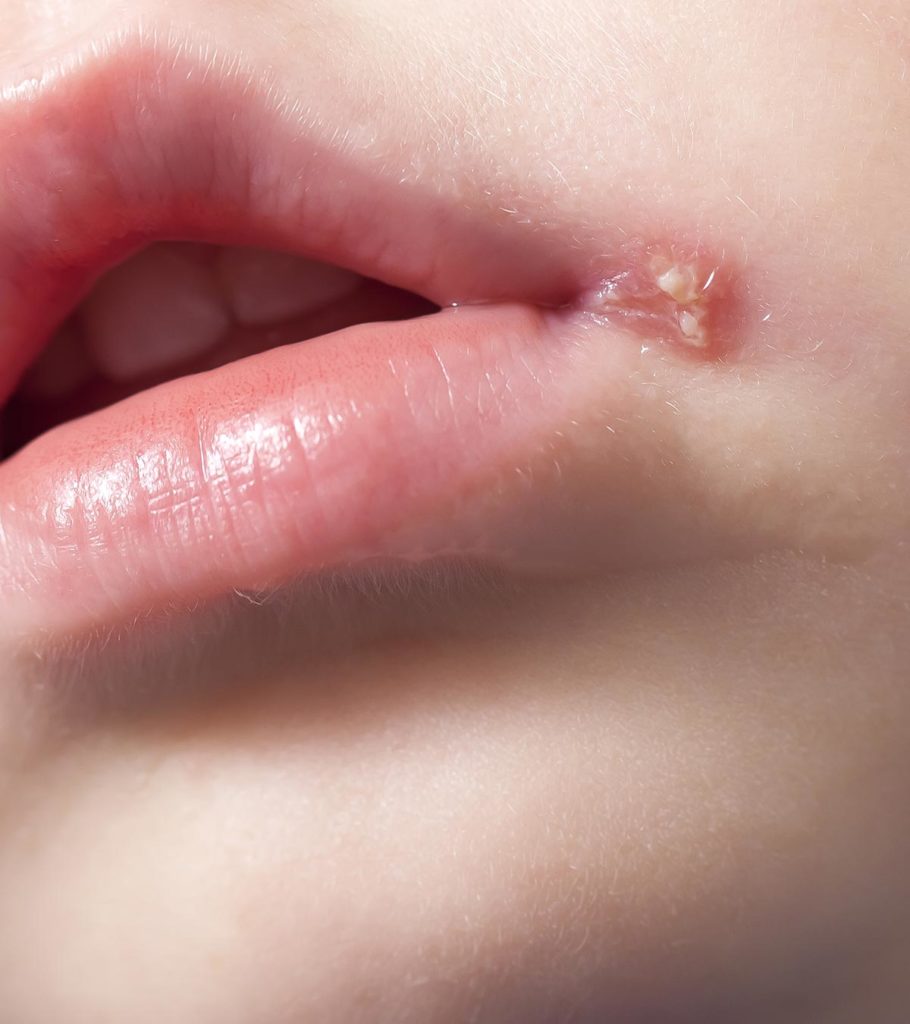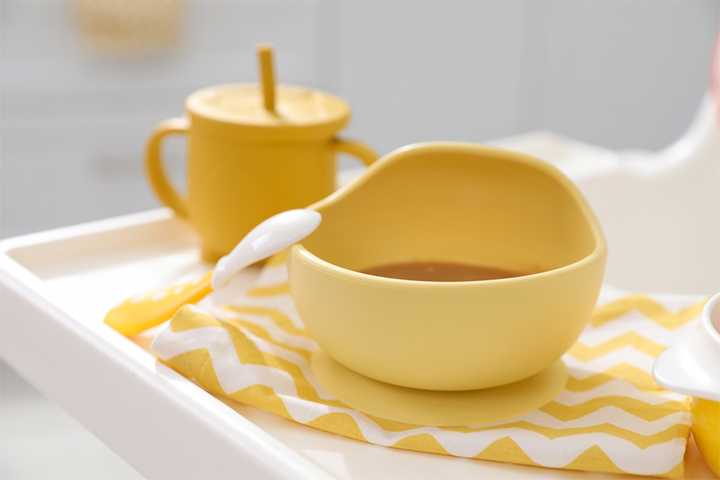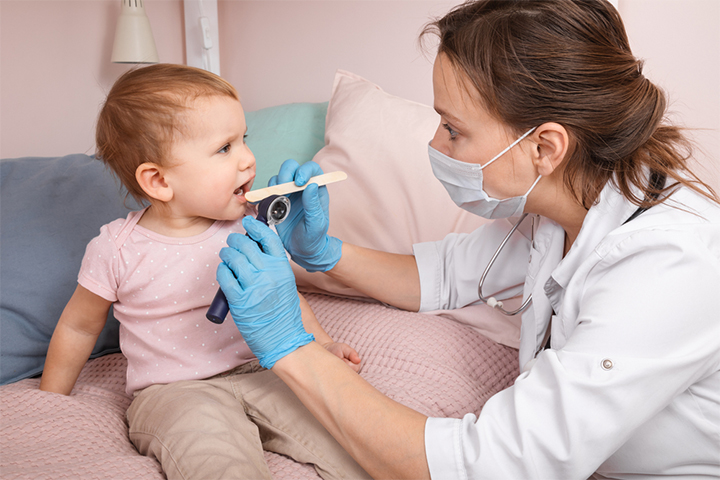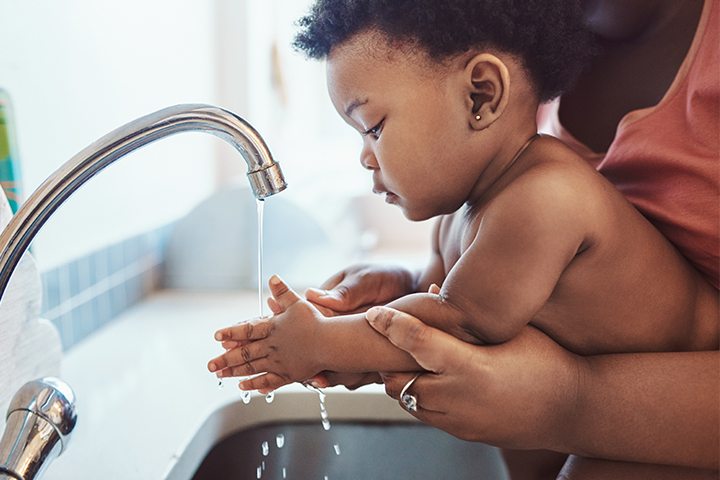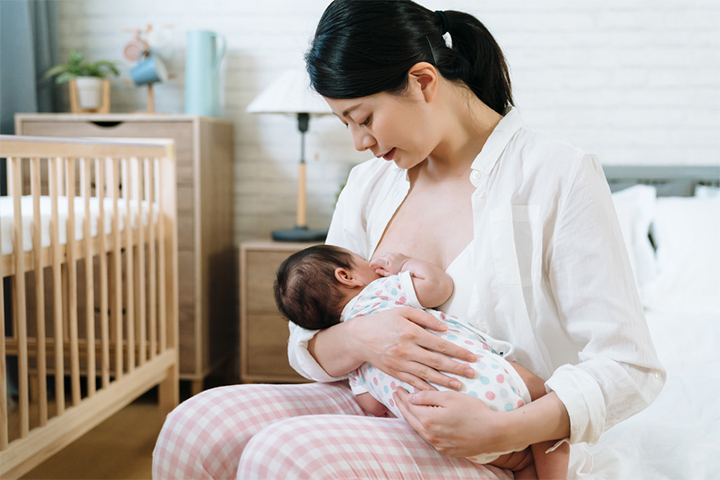Cold sores in babies are the blisters that appear around the lips. Although they are called cold sores, they do not cause a cold. They are named so because they might at times causes fever in babies. Most parents often confuse these sores with an allergy or a bacterial infection. But they are caused by a virus instead. Read on to know about cold sores, their causes, signs, diagnosis, treatment, and prevention techniques in this post.
What Is A Cold Sore?
Cold sores are tiny blister-like sores that appear around the lips or mouth. These sores are filled with a clear liquid that could ooze when the blister breaks. Fever often accompanies cold sores, and for that reason, they are also called fever blisters (1).
What Causes Cold Sores In Babies?
Cold sores, also known as oral herpes, are primarily caused by the herpes simplex virus type 1 (HSV-1) (2). A related virus called the herpes simplex virus type 2 (HSV-2) can also cause cold sores, although HSV-2 is usually responsible for sores in the groin region (genital herpes) (3). Cold sores due to HSV-2 are quite rare, and it is HSV-1 that is mostly responsible for the illness (4).
How Can A Baby Catch The Cold Sore Virus?
An infant can catch the herpes simplex virus (5):
- Through contact with an infected person’s lesion. The virus is mostly spread through direct contact with an infected person’s lesion. It occurs when an infected parent or a sibling kisses the baby.
- Sharing utensils. The virus may transmit through the saliva even if the infected individual does not have any cold sores. The herpes virus could spread about 24 to 48 hours before the first emergence of a cold sore. It means an infected parent or sibling may unknowingly pass the virus through the saliva by sharing a utensil with the baby.
- During birth. If the mother had genital herpes, then she can pass on the dormant HSV-2 virus to the baby during delivery, via the birth canal. Based on research by the MetroHealth Medical Center and the University of Florida, neonatal HSV infection occurs in approximately 1 in 3000 to 1 in 20,000 live births.
- Sharing washcloths and towels. The virus can latch onto a washcloth or towel from a cold sore and then pass to the next person who uses it. A baby can catch the virus if they share a towel with a parent or sibling.
The herpes virus can stay dormant for very long, so you may not even know you are carrying the virus. So, parents may unknowingly pass the virus even if they do not have any symptoms of the condition.
What Are The Symptoms Of Cold Sores In Babies?
The virus has an extended incubation period, and the symptoms may not emerge for as long as 2-12 days after contracting the virus.
Newborns who contracted the virus during birth will display the symptoms within the first four weeks. The symptoms depend on the baby’s overall health. Common symptoms of cold sores in babies include (6):
- Tiny, yellowish blisters around lips. The blisters mostly appear in a cluster around the lips. You could notice blisters on the cheeks, above the upper lip, on the chin, and even on the lips.
- Repeated itching of the lips. The baby may try to scratch the itchy, tingling and painful sores or the area around them. Older toddlers may point to the sore to indicate pain or discomfort in the area.
- The baby’s mouth may feel sore.
- They may have a low-grade fever of around 100 °F (37.7 °C).
- Cold sores around the lips make eating and drinking painful for the baby. So the little one will show poor interest in eating, breastfeeding, or formula feeding.
- The baby may appear less energetic than before and have chronic lethargy.
These symptoms could last for a few days to up to three weeks, depending on several factors like the severity of infection and the baby’s age. The symptoms are seldom dangerous, but in case of newborns and infants with weak immunity, the symptoms may be severe.
When to take the baby to the doctor
Take your baby to the pediatrician right away if he/she displays the following symptoms along with a cold sore:
- High fever, with a temperature of 100.4 °F (38 °C) or above (7)
- Unconsciousness
- Disinterest in eating to the extent that the baby does not eat or drink anything at all
- SeizuresiXAn abnormal and rapid electrical activity in the brain
- Swollen lymph nodes around the throat
The doctor may look at these symptoms and more before diagnosing cold sores.
How Are Cold Sores In Babies Diagnosed?
The following steps let the doctor accurately diagnose the condition:
- Visual inspection: Most doctors will diagnose the disease by mere examination of the cold sore blisters and their location on the body.
- Sore scrapings: A small scraping of the cold sore or the fluid from an oozing sore is collected and sent for laboratory analysis to detect the presence of a virus.
- Blood test: If the above methods are inconclusive, then the doctor may recommend a blood test to detect the virus in the blood.
In addition to the tests, the doctor may also about the family history of cold sores.
If the test results are positive for sores, then the doctor will suggest a suitable treatment.
How Are Cold Sores In Babies Treated?
There is no specific treatment for cold sores, and medication mainly aims at reducing the intensity of the symptoms and minimizing the spread of the virus to healthy cells. Usually, the immune system subdues the virus by itself.
Medication could be needed in cases where the infection is severe, the baby is premature, is a newborn, or is unable to cope with the disease due to weak immunity. Medicines that are commonly prescribed for the treatment of cold sores include:
- Oral antiviral medicines such as Acyclovir, Famciclovir, and Valacyclovir. The doctor decides the dosage of these medicines after assessing the baby’s symptoms.
- Antiviral cream to slow the spread of the virus and hasten the healing process.
- Antipyretics to control fever, and antibiotics might be required in the case of secondary infection. Homeopathy can be useful in building immunity, and hence works wonderfully for all sorts of viral infections. It also prevents recurrence.
In most cases, the baby may not require medications and will start feeling better with proper home care.
How To Manage A Baby’s Cold Sores At Home?
You can take the following steps to help the baby feel better right at home:
- Wash the sores periodically: Use a baby-safe antiseptic soap or body wash liquid and warm water to clean the sores regularly. It will prevent the spread of the virus and also fight away other opportunistic pathogens.
- Wash the hands of the baby regularly: Babies may touch the cold sores due to the tingling sensation they create. Since you can’t always stop the baby from touching the sores, wash the baby’s hands whenever you wash the sores. This also helps maintain basic hygiene and prevent the contraction of other diseases.
- Use an ice pack on the sores: Apply an ice pack on the sore for a few minutes to make the sores less painful or itchy. Remember to discard the ice pack later to prevent passing the virus to someone else.
- Use a washcloth dipped in warm water: If the baby finds the ice pack irritating, then you can use a washcloth dipped in warm water. Remember to use a clean washcloth that you can discard later.
- Wipe mouth with salt water: Babies tend to drool a lot. When wiping the mouth, use a cloth dipped in warm salt water solution to prevent the virus from spreading to the healthy skin around.
- Breastfeed more frequently: Research has found that antibodies in breast milk interfere with the virus’s ability to bind to healthy cells, making it harder for it to multiply and spread (8). Breast milk also stimulates the baby’s immune system to produce more immunoglobuliniXAntibodies produced by white blood cells to destroy viruses and bacteria by binding to them A (IgA) compound that can fight the virus (9).
- Give pain medication after doctor consultation: If the irritation from the sores seems to bother the baby a lot, then you can give medicines such as acetaminophen (paracetamol) or ibuprofen. But do so only after consulting a doctor.
Cold sores heal in about three weeks (10). The virus seldom causes any problems beyond the sores, but in some cases may lead to complications.
What Are The Complications Of Cold Sores In Babies?
Cold sores may cause the following complications in babies (11):
- Encephalitis: The virus could reach the brain where it could cause latent infectioniXCondition when the pathogen is lying dormant in the body with no visible symptoms. It can lead to a disease called encephalitis, which causes severe inflammation of the brain, eventually leading to seizures and other complications.
- HSV keratitis: When the baby touches the eye after touching or scratching a cold sore, the virus can pass to the eye and damage the cornea. In most cases, the damage is temporary. But in extreme cases, the baby could suffer blindness.
- Eczema herpeticum: Infants who already have eczemaiXAn inflammation of the skin accompanied by itchiness and dryness and get cold sores run the risk of developing a complicated version of eczema called eczema herpeticum. The condition can be painful and takes a very long time to cure (12).
Complications are most likely to affect infants with weak immunity and those below the age of six months. So, as far as possible, try to prevent the infant from catching cold sores.
How To Prevent Cold Sores In Babies?
You can prevent cold sores in babies through the following methods:
- Keep the baby away from infected individuals.
- Do not share any item with the baby. The baby’s items, including clothes, should be kept and washed separately.
- Avoid taking the baby to overcrowded places where the virus can spread quickly via skin contact.
- If you have cold sores, wear a nose and mouth mask while handling the baby. Wash your hands thoroughly with soap before handling the baby to prevent transmission of the virus.
- Take appropriate medication for cold sores during pregnancy. The baby runs the risk of catching the herpes virus during birth and medication can help prevent that.
- If your cold sores during pregnancy are not resolved, or you develop sores around the birth canal, then you can discuss with your doctor about having a cesarean delivery. It helps prevent the spread of the virus to the baby.
Prevention is the best way to keep the baby safe from HSV-1 and HSV-2. But if the baby gets infected, do they run the risk of having it again?
Can Cold Sores In Babies Recur?
Yes. The herpes virus can stay dormant within the nerve cells of the spinal cord and reinfect the body later. However, the reemergence of cold sores is subject to external triggers. The following triggers may cause cold sores again:
- Stress, fatigue, and lack of sleep
- Illnesses like cold or flu and conditions like dehydration
- Injuries to the skin including cracks and breaks in the skin
- Poor nourishment
- Exposure to intense sunlight and heat
- Dry and cold weather
The virus continues to stay inside the body for the rest of the life, so there is always a risk. But the chance of recurrence also depends on triggers and general health of the child. So, avoid exposing the child to the triggers after he or she recovers from cold sores once.
Read on to know the answers to some commonly asked questions about cold sores.
